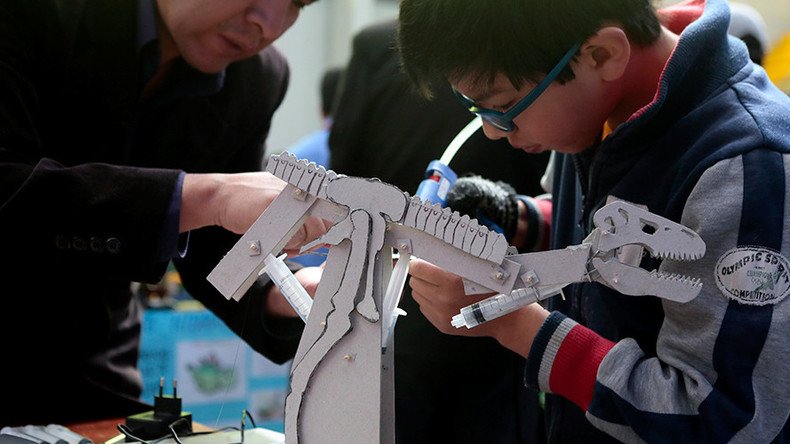’Teach the controversy’: States introduce bills to teach evolution as debatable theory

Texas is the eighth state this year to introduce legislation that would protect teachers who present science, including evolution, as a debatable theory. Critics contend these bills are a way to open the door to religion in the classroom.
The Lone Star State joins Alabama, Arkansas, Florida, Indiana, Iowa, Oklahoma and South Dakota as states that have proposed so-called academic freedom or “teach the controversy” bills, which allow public school teachers to include “opposing points of view or beliefs” when teaching scientific topics like global warming, evolution and the origins of life.
Louisiana (2008) and Tennessee (2012) have both passed laws that allow teachers to introduce religious materials in science classes as supplementary texts. When Louisiana’s school board voted to update its science standards on March 7, the revisions passed only after the inclusion of language reminding teachers about the 2008 law, AP reported. The revised standards are set to go into effect for the 2018-2019 academic year.
The majority of Americans believe that humanity was created or guided by God in its evolution, a 2014 Gallup poll found. Only 19 percent believe humans evolved from a more primitive form of life without divine intervention (Darwinism), while 42 percent believe God created humanity in its current form in the last 10,000 years (creationism), and 31 percent think that humans evolved from lesser advanced life forms, but God guided this process (intelligent design).
Kimberly Villanueva, a middle school teacher in southwest Texas, supports the bill because it would give her the flexibility to answer her students’ questions and "open [their] minds to scientific possibilities as well."
"I had children last year get up and leave the classroom when we taught plate tectonics and evolution," she told AFP, adding that current law prevents her from answering when her students ask her, “Don’t you believe in God?”
Not all teachers agree that the bill is necessary, however. Pam Wells, a high school science teacher in South Dakota, looked into teaching intelligent design at the request of some parents, but decided against it because the theories weren’t based in science, she told AP.
One high school senior told her he wouldn’t come to class if she opted to teach intelligent design over evolutionary theory. "He said, 'If I wanted to learn about that I'd go to church,’" Wells recalled.
The sponsor of the South Dakota bill, Republican Senator Jeff Monroe, said it would allow teachers to explain potential flaws in theories and introduce alternative scientific theories without fear of retribution because current state standards for teaching evolution and climate change are “one-directional directives” that don’t allow for analysis, the Sioux Falls Argus Leader reported. Such protections, Monroe added, would benefit students’ critical thinking skills.
Monroe’s bill died in committee at the end of February, while Iowa’s experienced a similar demise in early March.
Idaho GOP advances proposal to support Bible use in public schools http://t.co/E41FqWI0xCpic.twitter.com/qCVkvRz0hv
— RT America (@RT_America) June 11, 2015
Opponents say the bills are “antiscience,” and introduce religion, alternative facts and misleading rhetoric into the classroom.
“Although these proposed changes are typically presented by their supporters as giving teachers the chance to discuss genuine scientific controversies, in truth they are (very) thinly veiled attempts to pursue political and religious agendas that have no place in school science lessons — for whatever age,” the editorial board of Nature wrote.
Regardless of the outcome of these bills, schools will still be open to lawsuits, according to Glenn Branch, deputy director of the National Center for Science Education.
"Allowing the teacher to teach Creationism would risk the possibility of a lawsuit from a parent objecting that it's unconstitutional to teach Creationism,” he told AFP. "Stopping the teacher from proceeding would risk the possibility of a lawsuit from the teacher."
School teaches creationism using a video produced by anti-Semitic sex cult leaderhttps://t.co/dh0jYymbQupic.twitter.com/kUFsGeW4n6
— RT America (@RT_America) May 17, 2016
Louisiana, where “teach the controversy” is already in effect, ranks poorly in science testing results compared to other states, AP reported.
The Supreme Court banned the teaching of creationism in science classes in a 1987 decision, ruling that teaching that a supreme being created humankind endorses religion.
In 1997, a US District Court barred the teaching of intelligent design. Another District Court judge ruled that disclaimers stating that “evolution is a theory, not a fact” violated the First Amendment’s Establishment Clause in 2005.












